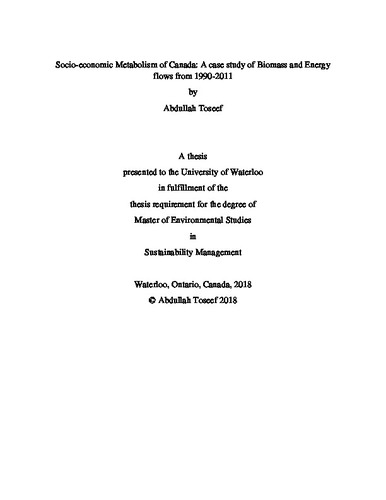| dc.contributor.author | Toseef, Abdullah | |
| dc.date.accessioned | 2018-01-22 21:20:33 (GMT) | |
| dc.date.available | 2018-01-22 21:20:33 (GMT) | |
| dc.date.issued | 2018-01-22 | |
| dc.date.submitted | 2018-01-21 | |
| dc.identifier.uri | http://hdl.handle.net/10012/12929 | |
| dc.description.abstract | Canada is ranked eighth, both as one of world’s leading producer of food as well as consumer of world’s total primary energy supply. Furthermore, Canada is one of the largest biomass and energy exporter, playing an important role towards world’s resource consumption. To understand Canada’s part in sustainable biomass production and energy security, it is important to analyze production, consumption and trade flows related to biomass and energy.
Using the MEFA indicators, this study attempts to operationalize biomass and energy metabolism of Canada. The data reflecting biomass incorporates the food, feed, forestry and other uses such as tobacco, and the data for energy contains food & feed, renewable and non-renewable energy sources. The research answers the following three questions: i) how has the metabolic profile of Canada changed over time, ii) How does Canada compare to other nations such as US in terms of biomass and energy use? iii) Where are potentials for a sustainability transition in biomass and energy sector?
Results indicate that Canada is self-dependent on biomass and energy consumption except for few food crops. Canada exports 30% of the biomass domestically produced and imports only 10% of the total biomass consumed locally. 54% of the technical energy domestically extracted is used for exports whereas 29% of the locally consumed technical energy comes from imports. This study further relates food & feed towards Canada’s total energy metabolism. The thesis also adds to the growing research of social metabolism and provides data points of Canada for global MEFA database. The study also encourages the discussion on food and energy security by providing key insights for the policy makers. | en |
| dc.language.iso | en | en |
| dc.publisher | University of Waterloo | en |
| dc.subject | Canada | en |
| dc.subject | biomass | en |
| dc.subject | energy | en |
| dc.subject | material and energy flow analysis (MEFA) | en |
| dc.subject | social metabolism | en |
| dc.subject | food security | en |
| dc.subject | energy security | en |
| dc.subject | sustainability | en |
| dc.subject.lcsh | sustainable development | en |
| dc.subject.lcsh | climatic changes | en |
| dc.subject.lcsh | forest products industry | en |
| dc.subject.lcsh | energy sector | en |
| dc.title | Socio-economic Metabolism of Canada: A case study of Biomass and Energy flows from 1990-2011 | en |
| dc.type | Master Thesis | en |
| dc.pending | false | |
| uws-etd.degree.department | School of Environment, Enterprise and Development | en |
| uws-etd.degree.discipline | Sustainability Management | en |
| uws-etd.degree.grantor | University of Waterloo | en |
| uws-etd.degree | Master of Environmental Studies | en |
| uws.contributor.advisor | Singh, Simron | |
| uws.contributor.affiliation1 | Faculty of Environment | en |
| uws.published.city | Waterloo | en |
| uws.published.country | Canada | en |
| uws.published.province | Ontario | en |
| uws.typeOfResource | Text | en |
| uws.peerReviewStatus | Unreviewed | en |
| uws.scholarLevel | Graduate | en |

